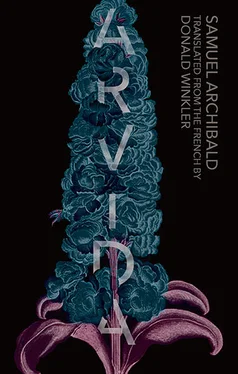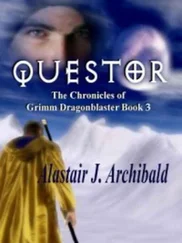In the middle of the night, she woke. Someone was sitting at the end of the bed. She felt a weight making a hollow in the mattress, and tugging at the bedclothes, right beside her feet. Her grandmother was there in her nightdress, smiling in the lunar half-light, holding out her hand to her, both rough and soft. She was wearing the lavender perfume she reserved for special occasions.
The little girl drew her hand out from under the covers, and stretched it forward. At the last moment she stopped, and closed her fist. The thing made itself even more loving, but it was too late.
Behind the smile, the lavender perfume, and the feigned benevolence, the little girl had seen the rictus, the hideous stench, and absolute evil. She pummelled the air with her feet and fists, and screamed at the dead. The thing rose up. Its nightdress was now a filthy soutane. There was no face. Just bone-white skin, and planted therein two eyes like raisins, contorted by hate. Through the large slits slashed into its neck on each side of its face, the thing hissed like a cat. This time it was neither her grandmother, nor her twin sister, nor the malformed ghost of the little girl they had both once been, but a demon of the fields, an occult force, nemesis to childhood, that seized on the shattered love of young girls to uproot them from the world.
The thing disappeared when the grandfather opened the door and came to take the little girl in his arms. She told him everything. The grandfather himself had become a bit of a sorcerer, out of necessity, through the years. He congratulated her on having defended herself so well, and told her that, had she grasped that hand, the thing would have taken her to a place that was not death, but where no one would want to go.
All week, while mourning her grandmother, she’d sought Jim with her eyes. But she found him nowhere. Months ago he had stopped coming to play cards with the little girl and her grandmother. She would have wanted Jim to take her to where the blueberries were. He would have put on soft music in his car, and opened the windows, and they would have got out to dance, right in the middle of the field. He would have kissed her on the mouth, saying that she was the only one for him, he would have blushed and said that it wasn’t good for her to ask him to touch her the same way you touch a woman or that he touched other girls.
The next week, Jim killed himself.
No one knew exactly why. They said he took drugs and owed a lot of money. He came from a village and had never really left it. He didn’t know that the world is wide enough for you to hide yourself in it.
He left one night in his car, and parked in their favourite field. It was full of blueberries, and run through with tight rows of black spruce.
Ten years earlier, the little girl’s father had brought in a big bulldozer to turn over a section of the field that was full of roots. The bulldozer was old. It broke down, and the operator left it there. For weeks her father called the agricultural equipment company to find out when they’d come to get it. They never came. Her father could have had it towed, but what was the point? Everyone liked the bulldozer a lot. It was a big sculpture in rubber and steel, falling apart in the sun. The shrikes made their nests on the driver’s seat, the paint was peeling, the metal rusting, and the machine was sinking into the crumbly soil a bit more each year.
The field was a single long small valley. From where he sat, Jim would have seen endless blueberry stalks, then the bulldozer perched on its mound, the dark wall of trees, and beyond that, the mountaintops.
The blueberry field had its own tragic beauty, but nothing to reassure a young man concerned about the Lord’s compassion for his flock. The fields were criss-crossed by insects, mice, field mice, gerbils; on their periphery you could flush out tetras and grouse. They were teeming with so much life that you couldn’t take three steps without killing something. The blueberry plants were veritable bonsais clutching at the earth, raked by the seasons, doused, frozen, then buried under tons of snow. Every four years, in autumn, they were burned. In spring the earth was fed with their ashes and they rose from their own graves.
There was nothing in that spectacle to save Jim, but everything to remind him that death and life are nothing, that the world orchestrates each instant the life and death of a billion things, that the living are born from the dead, and the dead give birth to the living, and that no one among the living and the dead is any the worse off for that.
From time to time she asks if, while breathing in carbon monoxide in little gulps, settled into his car, Jim wasn’t wanting to come into the world anew.
During the harvest, in the month of August, when the weatherman forecast a freeze, they lit big fires at the corners of the field. The wind made the flames dance and propelled the smoke, which crept in between the plants, enveloped the leaves, and protected the berries from the cold. When the wind was light you had to help it along by shaking big blankets in front of the fires. In the darkness it was like making passes with a cape, veronicas executed right up against the muzzles of great blazing bulls. He might have thought about that, Jim, instead of going out and killing himself. Those people formed a race of builders with heavy feet, unable to settle anywhere without felling a million trees and shooting off guns in all directions. The people were cunning and dumb, tender and cruel, fleshy but strong as horses. You had to see them moving with a matador’s grace, dangerously near the big fires, to save the fragile violet berries no bigger than peas, from the freeze. He could have joined with them, Jim, instead of going off to kill himself. Those people could snap a chicken’s neck with their bare hands, but they never allowed the delicate things the Lord placed in their care to die.
Not before the harvest, in any case.
Sometimes things are more difficult.
She dares not think of Jim, but she thinks often of her grandmother. Occasionally one of those grey days will come back to her vividly, the way the raw light fell onto the linoleum and the metal legs of the second-hand table, of how good it smelled in the kitchen where they sat to play cards. She remembers the smell of the dishes simmering on the stove, not one in particular but all at the same time, the colour of the walls that was different from now, the children’s programs that her afflicted uncles listened to at the other end of the house. The red playing cards swish as they slide across the green plastic tablecloth, a half-consumed cigarette fumes among pistachio shells in the ashtray, the rain taps out a tuneless tune on the dining room windows, but she finds nowhere the face of her grandmother, and sees too late that even this moment, this tiny moment, will never be returned to her.
Every year, in the month of March, she finds herself feeling an infinite sadness for things of no importance, and she rarely wants to make love. The rest of the time, she’s happy. She knows the future will be good, that the living and the dead watch over her, and that all will be for the best once more in the fields of the Lord. The cards murmur many things in the ears of people who know how to listen. Her grandmother taught her that a woman has the right to hear what she wants to hear and to leave all the rest suspended from the wings of the birds of affliction.
She’d always wanted to be blonde, but never dared.
It was only for those creatures who bleached their hair, creatures who wore culottes and cut their hair short. She had dark hair that she wore very long, flowing free, and she would have felt naked without its weighty shadow on the back of her neck. The creatures danced to jazz. Gemma idled at home, tranquil, dreaming of sweeping waltzes that no one danced any more, anywhere.
Читать дальше












